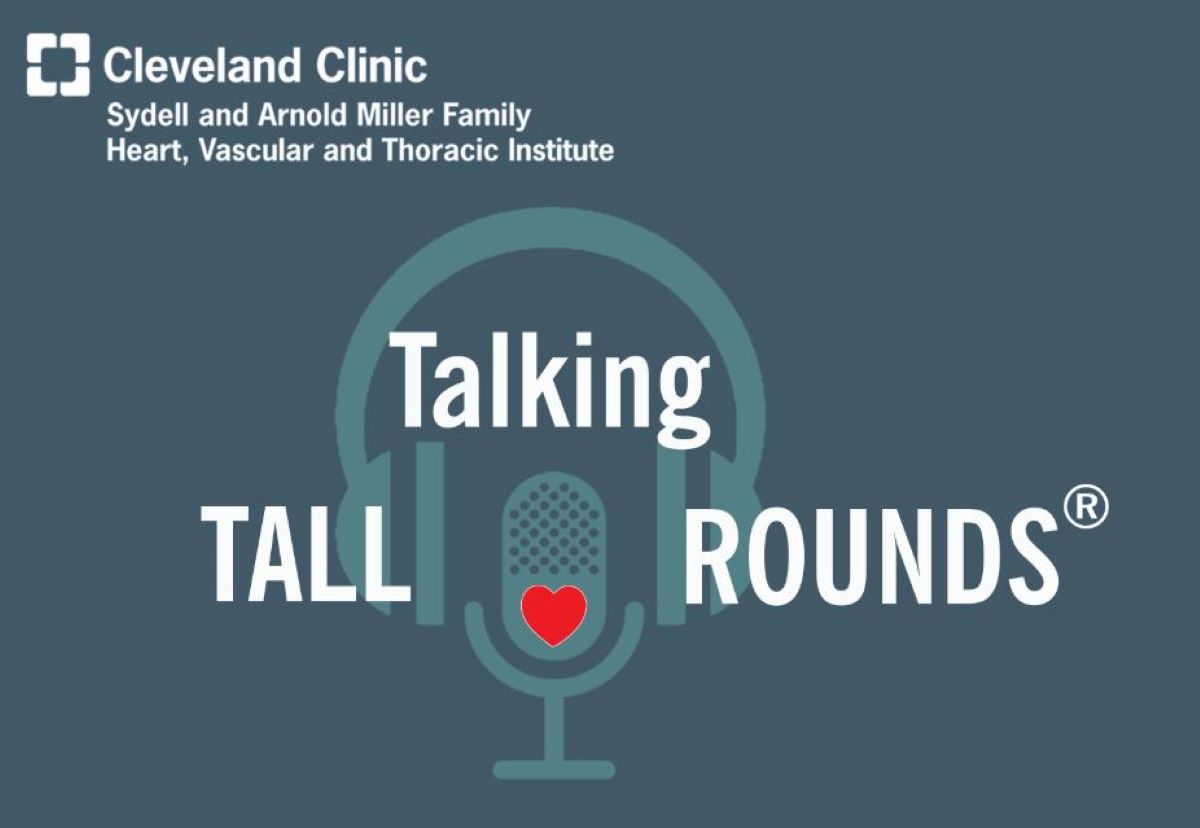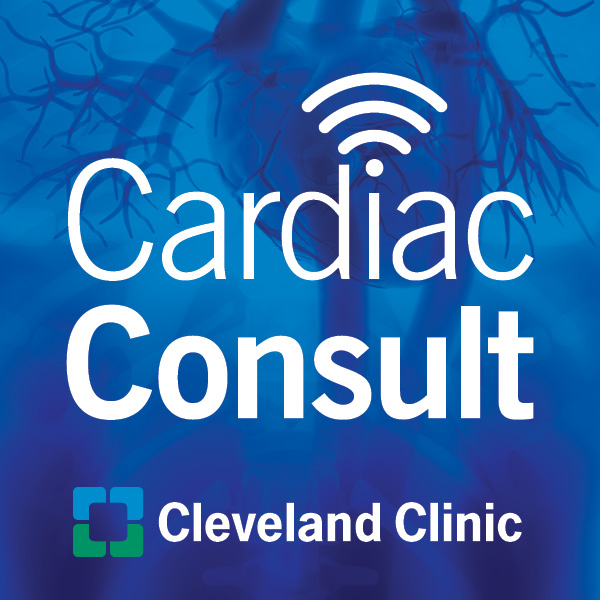Talking Tall Rounds: Hypertension in 2024 and Beyond

Luke Laffin, MD, Co-Director, Center for Blood Pressure Disorders, discusses the current state of hypertension current treatment options, and emerging therapies.
Subscribe: Apple Podcasts | Buzzsprout | Spotify
Talking Tall Rounds: Hypertension in 2024 and Beyond
Podcast Transcript
Announcer:
Welcome to Cleveland Clinic Cardiac Consult, brought to you by the Sydell and Arnold Miller Family Heart, Vascular & Thoracic Institute at Cleveland Clinic.
Luke Laffin, MD:
What's the standard of care right now? All of us know it's the ACD combination. Then when that doesn't work, guidelines recommend that we add an MRA, so spironolactone and eplerenone, and that's based on the PATHWAY-2 data. But is this good enough? If you haven't caught on yet, no, it isn't. Okay? This is updated circulation or statistics from NHANES from the most recent statistics published in Circulation. So what we can see is that about 60%, 60-65% of people are aware that they have hypertension, about half are under treatment, but only a quarter are controlled when we look at that 130/80 definition. That's irrespective of age or race in this scenario. A little bit older, you tend to have a little bit better control as you can see on the right side of the slide, but it's still only 1/3 of individuals. So the question that we're going to talk about over the next 40 minutes or so is, can we move towards a more effective approach?
I'm going to propose a few different ways that we're going to do that because there's a real renaissance in terms of hypertension, drug therapy and how we treat it. So here, number one, this is a potential way to do it. So I'm going to show some numbers, 26 to 28% and then 40%. So these are statistics respectively from the Framingham Heart Study and the Nurses' Health Study. These are the percentage of hypertension cases attributable to excess body weight, so overweight and obesity. What about this number, 76%? Well, this is our resistant hypertension clinic patient population with body mass index over 25. More than three quarters of these individuals and probably about half have a body mass index over 30, and so we know that obesity contributes to hypertension. Now, I like to think about it in this way because we know that not all patients with obesity have hypertension, but we do know that if you do have obesity, you are more likely to have it.
So if you look at the frequency on the Y axis here and the blood pressure on the X axis, what we can see is that in lean individuals, some are going to have hypertension, but the majority probably are not. But as we develop obesity and have weight gain, what we see is that frequency and that distribution of blood pressure changes so it shifts towards higher levels more than anything else. By the time we're up in that body mass index 30, 35 plus, the majority of those individuals will have hypertension. We also know that hypertension and obesity are very prevalent in the same areas of the country. Okay? If we look obviously the Southeast in terms of all cardiovascular disease, we see it and then we can see we're right on the border of it in Cleveland here. But in some areas of the country, we're talking more than half the individuals have hypertension, and almost half those individuals are living with obesity as well. So how does obesity increase blood pressure? Well, again, it's multifactorial. There's several mechanisms operating simultaneously, so there's sympathetic activation, especially that visceral adiposity that we see.
We can see increased renal sodium reabsorption, release of renin. Also, leptin stimulates the sympathetic nervous system. We know natriuretic peptides decrease, and we know that their concentration increases after any type of metabolic surgery. There's mechanisms associated with the renin angiotensin aldosterone system, which increase MR activity, aldosterone, et cetera. We know that in obesity there's extracellular fluid volume expansion, increase in venous return and cardiac output amongst others, obviously extra adiposity and induces inflammation, insulin resistance, sleep apnea, et cetera. Okay? So there's all kinds of things going on.
Now, if we just tell patients to lose weight with lifestyle, what do we get in terms of blood pressure reduction? Well, there was a meta-analysis of 25 randomized control trials of non-pharmacological weight loss. What we can tell patients is that if you lose a kilogram of your body weight, you get about one millimeter of mercury reduction. Okay? So nothing to write home about there, but that's what we know. Now, it doesn't mean we shouldn't tell individuals to exercise. We know that there's numerous beneficial effects: reduced inflammation, arterial stiffness, et cetera, but it's not a game changer when we think about obesity-associated hypertension.
What about metabolic surgery and blood pressure? Well, it's not just weight loss. We see blood pressure reduction in individuals with metabolic surgery as early as one week postoperatively. So there's multiple neuroendocrine mechanisms that are at play. We get an increase in GLP-1, increase in circulating natriuretic peptides like I talked about. Now, it's not completely understood, but we know it plays a role. One of the most significant randomized clinical trials to look at this was the GATEWAY RCT. So it was gastric bypass to treat patients with obesity, with hypertension. So what it was, was you had to have a body mass index between 30 and 40 and beyond two or more blood pressure medicines, and you were randomized to run Y gastric bypass plus medical therapy or just medical therapy alone. Now, this was open label. Okay? There was no sham bypass surgery, but the primary endpoint, I thought was pretty clever, was a reduction in 30% of the total blood pressure medicines while maintaining a normal or controlled blood pressure at that time, 140/90, and so this is what they showed.
So amongst those individuals that got medical therapy plus metabolic surgery, 83, almost 84% of those individuals achieved that reduced their blood pressure medicines by a third and got their blood pressure under control, whereas, only 13% in the medical therapy achieved this. So very clearly a benefit from that. Then the panel on the right is interesting, I think, looking at the difference between baseline and at 12 months in terms of the distribution of medicines, patients got off medicines. We looked, half of the patients that received gastric bypass were no longer on blood pressure lowering medicines, whereas medical therapy, the distribution was essentially the same. Okay? They were on the same number of medicines. Now, we all know that obesity or the treatment of obesity as a chronic disease is just exploding in the United States. So the question is, well, what is the effect of these anti-obesity meds compared with placebo on blood pressure? So there's a list of some of the more common ones historically that we've used, and you can see this impact is relatively modest.
Naltrexone/bupropion actually increases blood pressure a little bit, but liraglutide, phentermine/topiramate and orlistat, pretty modest decreases. What you can see on the far right is semaglutide, and that's not an insignificant difference there. Okay? We're talking 6/3 millimeter mercury change. If you look at the SELECT trial where patients only got about a 9% total body weight loss, it was about three to four millimeters of mercury systolic. So again, in that ballpark as well. The red here is how much body weight in these studies, when they looked at how much they got, about 15%. Okay? Well, what I think is exciting is also these combined GLP-1 GIP agonists and their impact on not only weight but blood pressure as well, which tirzepatide is really the hallmark case of this. So these are some data from SURMOUNT-1, so the obesity study published in New England Journal about two years ago now, a year-and-a-half or so, actually, and this is from the supplement looking at blood pressure changes.
These were patients who had relatively well-controlled blood pressure at baseline, 123 systolic over 79 diastolic. So what you can see at each of the doses, five, 10 and 15, there was a significant decrease in blood pressure. We're talking six to seven millimeters of mercury in this scenario. Now, what they also did was they did an ambulatory blood pressure monitoring subset. So 600 individuals, they had to have controlled blood pressure at baseline. This was really done to look at heart rate as well, because we know that the GLP-1s and GIP agonists can increase heart rate a little bit. So ultimately, they had just under 500 with a valuable ABPM data, body mass index of 37. Now, these are some data that I think they're being published next... Yeah, they are being published next week in Hypertension that we looked at and really the difference in terms of ambulatory blood pressure monitoring. We see a pretty similar idea that we saw to the office blood pressure. So with the doses of five, 10, and 15 of tirzepatide, you see overall about anywhere between eight and 11 millimeter mercury decrease in systolic blood pressure, a little bit less so in diastolic as well as a pretty significant nighttime dipping. We want on average blood pressure to go down 10 to 20% at night. That's normal, and so we saw a reduction here of nine millimeters of mercury in the tirzepatide 10 milligram arm.
What we also see is that this blood pressure reduction really didn't matter depending on a variety of statistics. If you're old, young, BMI 35 or less, or 35 or more, if they were on blood pressure medicines or not, you didn't really see a major difference there in terms of... so everyone seems to benefit from this.
So as that first thought of, could we be more effective is, could there be a role for upfront treatment of obesity, particularly in patients with stage 1 hypertension? Treat that cause upfront. Don't just treat the blood pressure, treat everything else. So I think we'll see in the future if there's a role for that.
Announcer:
Thank you for listening. We hope you enjoyed the podcast. We welcome your comments and feedback. Please contact us at heart@ccf.org. Like what you heard? Subscribe wherever you get your podcasts, or listen at clevelandclinic.org/cardiacconsultpodcast.

Cardiac Consult
A Cleveland Clinic podcast exploring heart, vascular and thoracic topics of interest to healthcare providers: medical and surgical treatments, diagnostic testing, medical conditions, and research, technology and practice issues.



